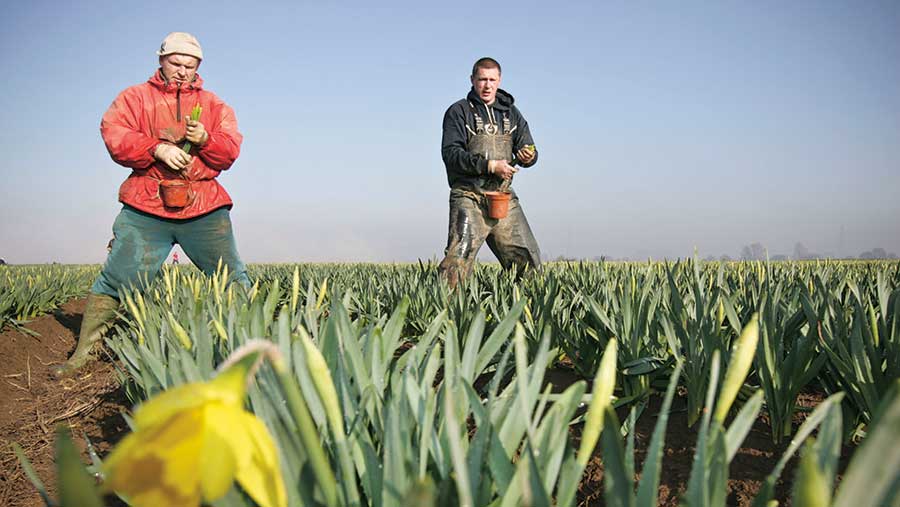Opinion: Seasonal workers bring reality of war close to home
 © Tim Scrivener
© Tim Scrivener At the time of writing, we have 200 flower croppers working happily in fields harvesting daffodils in preparation for the huge Mother’s Day demand – next weekend on 27 March.
All of our regular seasonal staff returned in January and the fears we had about a shortage of workers didn’t materialise.
We have been busy for the past couple of years assisting our team with their applications for settled status, plus we have invested in more staff accommodation and increased our payrates by 20% this year.
The investment appears to have paid off and we will still be able to do our work, albeit with lower profits. The old adage that “predicted shortages never happen” has been true in this respect.
In every other respect on the farm, however, the predictions of shortages have been much more accurate and we are facing large cost increases and poor availability for many inputs.
See also: Ukraine war could trigger double-digit fall in UK food output
Most of our workforce come from Romania, so the humanitarian tragedy taking place in Ukraine feels close to home.
The personal stories we hear from them and the shocking scenes in the media reveal how precious and fragile are the circumstances of a happy and peaceful life, and how easy it is to take them for granted.
With knowledge of the horrors being borne by families in Ukraine, it feels callous to complain too vigorously about the impacts that we are facing in the UK as a result of the invasion.
The price volatility we are all experiencing is going to be financially damaging to some farming families here, but it may also make others very wealthy.
There will be no justice in the way that the consequences of this situation will be borne.
The big surprise to many people will be just how quickly the conflict impacted the cost and availability of goods here.
It has been a short, sharp lesson in the frailties of the global food chain and the vulnerability caused by relying on the wrong people for essential inputs.
My generation, which includes many of our current politicians, is used to abundance. We grew up in a landscape of butter mountains and wine lakes.
The post-Second World War agricultural policies to end food shortages were so successful that they created a raft of problems related to overproduction – a collapse in farm profitability, worsening public health and environmental and ecological crisis.
They were so successful that we even paid farmers public money to leave land empty.
The current experience teaches us that an EU tax on artificial fertiliser would have been a far cheaper and more effective tool to manage oversupply and pollution than the old scheme for “set-a-side” ever was.
It could be a hard year, but climate-friendly farms should fare better than polluting ones and the spiralling of energy costs will favour small producers and regional processing.
The big challenge and opportunity for farmers is to wean themselves off their dangerous addiction to ammonium nitrate and fossil fuel.
This is the only way that we can truly guarantee the nation food security.

